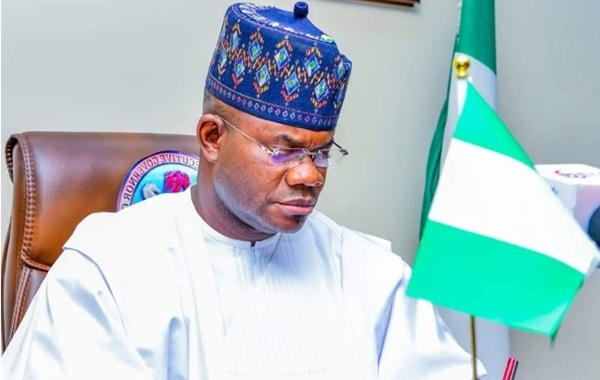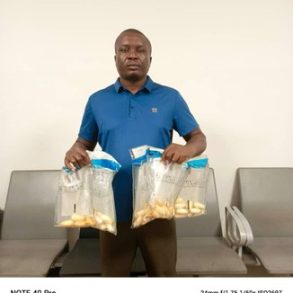The Chairman of Economic and Financial Crimes Commission (EFCC), Ola Olukoyede, on Tuesday, gave more details of the criminal case against former Kogi State governor, Yahaya Bello.
The agency has already charged Bello with 19 counts of money laundering involving over N80 billion at the Federal High Court in Abuja, but has been unable to prosecute him due to difficulty in arresting him.
Giving fresh insights into the case against the former governor, Olukoyede said Tuesday that $720,000 stolen from the Kogi State treasury was used to pay the school fees of one of Bello’s children.
Olukoyede, who was speaking at a press conference in Abuja, with a snippet of his remarks captured in a short clip posted by Channels Television on its Facebook page, said Mr Bello withdrew the funds through a male cashier at the Kogi State Government House in Lokoja.
He alleged that the former governor funnelled the funds through a bureau de change operator, whose name Olukoyede did not reveal.
He said: “A sitting governor, because he knows he is going, moved money directly from government through a cashier to bureau de change, used it to pay the child’s school fee in advance, $720,000 in advance, in anticipation that he was going to leave Government House.
“In a poor state like Kogi, and you want me to close my eyes to that under the guise of ‘I’m being used.’ Being used by who at this stage of my life?”
In the clip which played for three minutes and 27 seconds, Olukoyede urged Nigerians to approach the Federal High Court in Abuja for the certified true copy of proof of evidence attached to the N80 billion money laundering charges filed against Bello.
Bello, 48, who left office as governor on 27 January, faces 19 counts of money laundering at the Federal High Court in Abuja.
In the charges, EFCC accused him, his nephew Ali Bello, Dauda Suleiman and Abdulsalam Hudu (said to still be at large) of conspiring to convert the total sum of N80 billion public funds to personal use in February 2016.
The commission alleged that Bello and others “reasonably ought to have known” that the money “forms part of the proceeds of your unlawful activity” – criminal breach of trust.
EFCC also alleged in another count that Bello, between 26 July 2021 and 6 April 2022 in Abuja, aided a firm, E-Traders International Limited, to conceal the aggregate sum of over N3 billion (N3,081,804,654) in account number 1451458080 domiciled in Access Bank Plc.
Stalled arraignment
The move to prosecute Bello before the Federal High Court in Abuja has failed twice.
The scheduled arraignment was stalled on 18 April and again on Tuesday due to Bello’s absence from court on both occasions.
The trial judge, Emeka Nwite, on Tuesday, took the extraordinary step of ordering the EFCC to serve Bello with the charges through his lawyer who has been appearing for him.
Ahead of the first court sitting, the trial judge, Mr Nwite, on 17 April, issued a warrant for the arrest of the former governor.
However, with the help of his successor, Governor Usman Ododo, and police officers attached to his residence in Wuse Zone 4, Abuja, Bello managed to evade arrest by EFCC when the operatives of the agency laid siege to the Abuja house to execute the warrant of arrest shortly after the court issued it.
That same day, the Kogi State High Court in Lokoja gave a judgement barring the EFCC from arresting or detaining him.
War of words
The development has triggered a wave of criticism from many who accused the EFCC of disobeying a court order by making moves to arrest Bello.
They argue that the only option EFCC had was to appeal against the order.
But in the ensuing war of words, EFCC, both in press statements and during court proceedings, has maintained that it did no wrong, arguing that the court order issued in favour of Mr Bello in a fundamental human rights enforcement suit did not preclude another court from ordering his arrest to answer to criminal charges.
The agency declared Bello wanted on the day he first failed to appear in court, with the Attorney-General of the Federation, Lateef Fagbemi, calling on Mr Bello to surrender himself to the anti-corruption agency.
‘Due process followed.’
Olukoyede further justified the steps EFCC has taken against Mr Bello on Tuesday, saying the commission did all that needed to be done, including personally calling the former governor over the phone to invite him for interrogation.
He said Bello declined to honour EFCC’s invitation on the basis that a lady had mobilised journalists to the anti-graft agency’s office to harass him.
The EFCC helmsman said Bello then requested that he be interrogated at his village in Okene Local Government Area of Kogi State.
“On my own, I called him, which I am not supposed to do, just to honour him as an immediate-past governor. ‘Sir, there are issues. I’ve seen this case file. Can you just come let us clarify these issues?” Olukoyede recalled his phone conversation with Bello.
‘Ha! Thank you, my brother. I know, but I can’t come. There’s one lady that has surrounded EFCC with over 100 people to come and embarrass me and intimidate me’,” the EFCC chair quoted Bello as saying on phone.
‘I didn’t initiate Bello’s case.’
Reacting to insinuations that he was being used to wage a political witch-hunt against Bello, Olukoyede clarified that the former governor’s case preceded his assumption of office.
“I didn’t initiate the case; I inherited the case file. I called for the file, and I said there are issues here.
“I am so passionate about the need for us to move forward in this country,” Olukoyede said in apparent frustration concerning allegations of bias against the commission.
He said the EFCC, on his watch, within six months, recovered about N120 billion from criminals who swindled their victims.
Olukoyede added that the EFCC recorded over 1,600 convictions since he took office last year.





